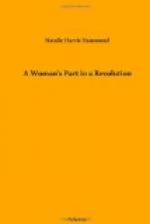As in the preliminary examination, the Court proceedings were conducted in the Dutch language, an unfamiliar tongue to a majority of the accused.
After the despatch of some minor matters, Mr. Wessels, counsel for the defence, made his address to the Court, closing by reading the written statement of the four leaders, and asking the clemency of the Court.
He made no reference or protest to the tribunal as constituted—a Court presided over by a Judge not a citizen of the country whose sovereignty had been offended by the treasonable acts charged.
Mr. Wessels was followed by the State Attorney, Dr. Coster, in a bitter and vindictive speech.
He demanded that the prisoners at the bar should be punished under the Roman Dutch Law, and that the four leaders should receive the death penalty.
This demand of the State Attorney was apparently a surprise to Mr. Wessels, for he sprung to his feet in an excited manner and protested most vigorously against the demand of Dr. Coster; his language and manner were such as to impress many present that it was provoked by a breach of good faith.
At the conclusion of the speech of the State Attorney, Gregorowsky (the imported Judge) summed up the case at length, and held that the prisoners were guilty of high treason as charged in the indictment, and that the Roman Dutch Law governed in such cases; and that the sentences imposed would be in accordance therewith.
The Sheriff then with a loud voice commanded silence whilst the sentence of death was pronounced.
A deep hush fell upon the Court-room—a profound, breathless silence that became oppressive before the next official utterances disturbed it.
‘Lionel Phillips, George Farrar, Francis Rhodes, John Hays Hammond!’ called the Registrar.
In response these four were singled out from the rest of the prisoners and conducted to the new dock.
It was the Registrar who again spoke.
’Lionel Phillips, have you any legal reasons to urge why sentence of death should not be passed upon you, according to law?’
‘No,’ was the response.
This was followed by the sentence.
In like manner, Farrar and Rhodes were interrogated and sentenced.
Mr. Hammond was then called to his feet and the same formal question asked.
Although pale and weak from protracted illness, Mr. Hammond responded in a firm voice to the Registrar’s question.
The Judge, then addressing the prisoner, said: ’John Hays Hammond, it is my painful duty to pass sentence of death upon you.
’I am only applying the punishment which is meted out and laid down according to law, leaving it to his Honour the State President, and the Executive Council, to show you any mercy which may lie in their power.
’May the magnanimity shown by his Honour the State President, and this Government, to the whole world, during the recent painful events be also shown to you.




